Every evening the public of Cinema Ritrovato gathers at the Piazza Maggiore for a spectacular open air screening. We won't miss West Side Story (1961). Buoyed by Robert Wise's dazzling direction, Leonard Bernstein's score, and Stephen Sondheim's lyrics, this musical remains perhaps the most iconic of all the Shakespeare adaptations. On its release, the film received high praise from critics and viewers, and became the second highest grossing film of the year in the United States.
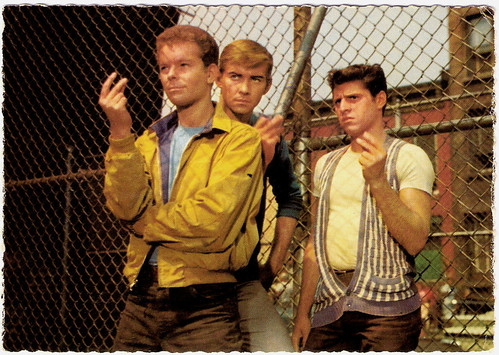
Vintage postcard. Publicity still for West Side Story (Robert Wise, Jerome Robbins, 1961) with Russ Tamblyn.
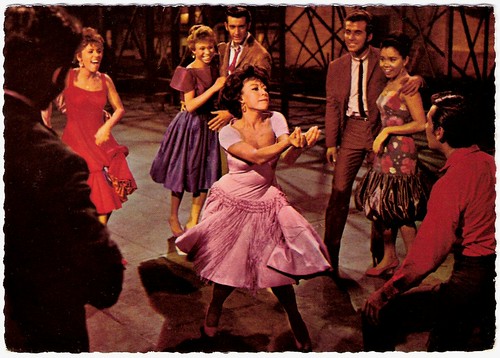
Dutch postcard. Photo: publicity still of Rita Moreno in West Side Story (Robert Wise, Jerome Robbins, 1961).
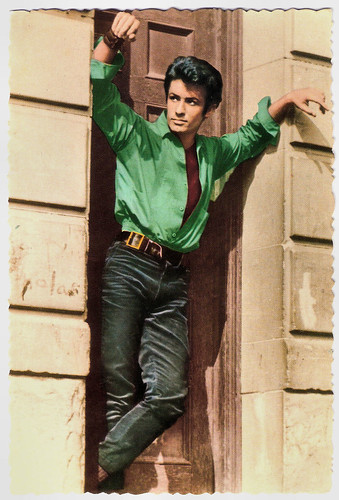
Spanish postcard by Archivo Bermejo, no. C. 65, 1963. Photo: United Artists. Publicity still of George Chakiris in West Side Story (Robert Wise, Jerome Robbins, 1961).
West Side Story (1961) is a classic American musical directed by Robert Wise and Jerome Robbins.
Two youngsters, played by Nathalie Wood and Richard Beymer, from two New York City gangs fall in love. The tensions between their gangs - the white Jets led by Riff (Russ Tamblyn) and the Puerto Rican Sharks, led by Bernardo (George Chakiris) - build toward tragedy.
The film is an adaptation of the 1957 Broadway musical of the same name, which in turn was inspired by William Shakespeare's play Romeo and Juliet. Veteran director Robert Wise was chosen to direct and produce because of his experience with urban New York dramas such as Odds Against Tomorrow (1959).
Since he had no experience directing a musical, Wise agreed that Jerome Robbins, who had directed the stage version of West Side Story, would direct the musical and dance sequences. After about one-third of the movie had been shot, the Mirisch Company, concerned that the production was running over-budget, dismissed Robbins. Robbins nearly suffered a nervous breakdown during the time he worked on the film.
The remaining dance numbers were directed with the help of Robbins' assistants. Recognising Robbins' considerable creative contribution to the film, Wise agreed that Robbins should be given co-directing credit, even though Wise directed the greater part of the film. The opening titles and end credits sequences were created by Saul Bass, who is also credited for 'visual consultation' on the film.
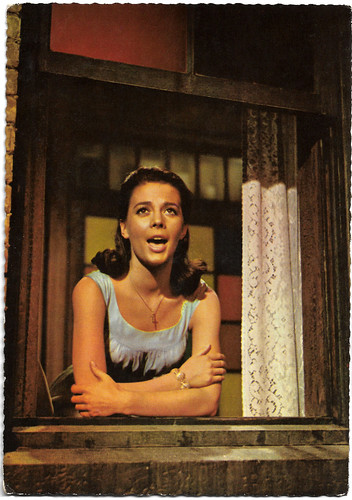
Dutch postcard by Gebr. Spanjersberg N.V., Rotterdam. Publicity still of Nathalie Wood in West Side Story (Robert Wise, Jerome Robbins, 1961).
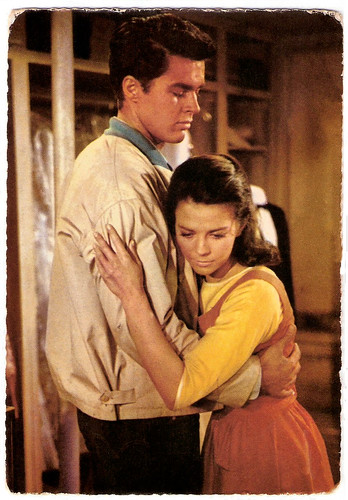
Dutch postcard by Gebr. Spanjersberg N.V., Rotterdam. Publicity still of Nathalie Wood and Richard Beymer in West Side Story (Robert Wise, Jerome Robbins, 1961).
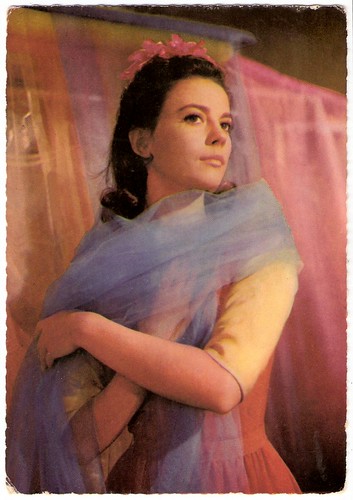
Dutch postcard. Photo: publicity still of Nathalie Wood in West Side Story (Robert Wise, Jerome Robbins, 1961).
West Side Story (1961) stars Natalie Wood, Richard Beymer, Russ Tamblyn, Rita Moreno, and George Chakiris.
Because the producers wanted actors who looked believable as teenagers, they did not consider 30-year-old Larry Kert, the first Tony on Broadway, or 29-year-old Carol Lawrence, the first Maria, but some actors in the cast had experience in stage productions.
Tony Mordente, who played A-Rab on stage, was cast as Action in the film, and George Chakiris, Riff in the London stage production, played Bernardo in the film.
For the role of Tony, the producers settled on five candidates: Warren Beatty, Anthony Perkins, Russ Tamblyn, Troy Donahue, and Richard Beymer. Although he was 28 before filming began, Perkins' boyish looks and Broadway resume seemed to make him a contender for the role.
Robert Wise originally chose Beatty for the role, figuring that youth was more important than experience. Ultimately, Beymer, the most unlikely of the candidates, won the part of Tony. Tamblyn, after several callbacks, impressed the producers and was given the role of Riff.
Natalie Wood was filming Splendor in the Grass (Elia Kazan, 1961) with Warren Beatty and was romantically involved with him off-screen. The producers were considering her for the role of Maria. When Beatty went to screen test for the role of Tony, Wood read opposite him as Maria as a favour because she had been practising with him. The producers fell in love with the idea of Wood as Maria but did not cast Beatty.
The film was nominated for 11 Academy Awards and won 10, including Best Picture and Best Supporting Actors awards for George Chakiris and Rita Moreno. This made West Side Story (1961) the musical film with the most Oscars, including Best Picture, ever.
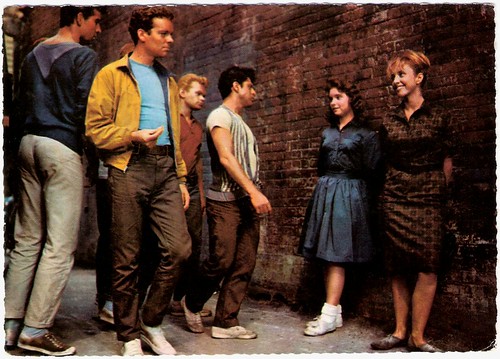
Vintage postcard. Publicity still for West Side Story (Robert Wise, Jerome Robbins, 1961) with Russ Ramblyn.
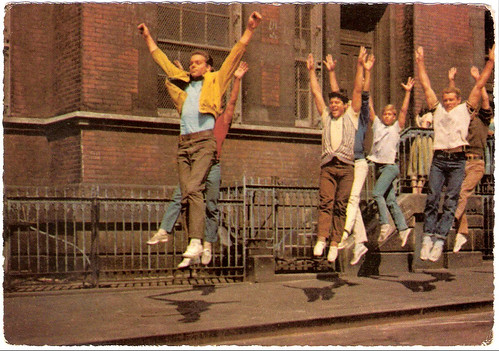
Vintage postcard. Publicity still for West Side Story (Robert Wise, Jerome Robbins, 1961) with Russ Ramblyn.
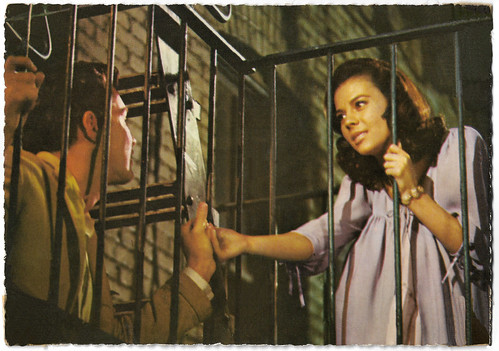
Dutch postcard by Gebr. Spanjersberg N.V., Rotterdam. Publicity still of Nathalie Wood and Richard Beymer in West Side Story (Robert Wise, Jerome Robbins, 1961).
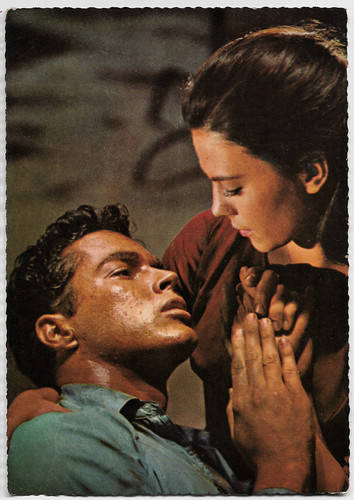
Dutch postcard by Gebr. Spanjersberg N.V., Rotterdam. Publicity still of Nathalie Wood and Richard Beymer in West Side Story (Robert Wise, Jerome Robbins, 1961).
Sources: Wikipedia and IMDb.

Vintage postcard. Publicity still for West Side Story (Robert Wise, Jerome Robbins, 1961) with Russ Tamblyn.

Dutch postcard. Photo: publicity still of Rita Moreno in West Side Story (Robert Wise, Jerome Robbins, 1961).

Spanish postcard by Archivo Bermejo, no. C. 65, 1963. Photo: United Artists. Publicity still of George Chakiris in West Side Story (Robert Wise, Jerome Robbins, 1961).
The Jets versus The Sharks
West Side Story (1961) is a classic American musical directed by Robert Wise and Jerome Robbins.
Two youngsters, played by Nathalie Wood and Richard Beymer, from two New York City gangs fall in love. The tensions between their gangs - the white Jets led by Riff (Russ Tamblyn) and the Puerto Rican Sharks, led by Bernardo (George Chakiris) - build toward tragedy.
The film is an adaptation of the 1957 Broadway musical of the same name, which in turn was inspired by William Shakespeare's play Romeo and Juliet. Veteran director Robert Wise was chosen to direct and produce because of his experience with urban New York dramas such as Odds Against Tomorrow (1959).
Since he had no experience directing a musical, Wise agreed that Jerome Robbins, who had directed the stage version of West Side Story, would direct the musical and dance sequences. After about one-third of the movie had been shot, the Mirisch Company, concerned that the production was running over-budget, dismissed Robbins. Robbins nearly suffered a nervous breakdown during the time he worked on the film.
The remaining dance numbers were directed with the help of Robbins' assistants. Recognising Robbins' considerable creative contribution to the film, Wise agreed that Robbins should be given co-directing credit, even though Wise directed the greater part of the film. The opening titles and end credits sequences were created by Saul Bass, who is also credited for 'visual consultation' on the film.

Dutch postcard by Gebr. Spanjersberg N.V., Rotterdam. Publicity still of Nathalie Wood in West Side Story (Robert Wise, Jerome Robbins, 1961).

Dutch postcard by Gebr. Spanjersberg N.V., Rotterdam. Publicity still of Nathalie Wood and Richard Beymer in West Side Story (Robert Wise, Jerome Robbins, 1961).

Dutch postcard. Photo: publicity still of Nathalie Wood in West Side Story (Robert Wise, Jerome Robbins, 1961).
Believable teenagers
West Side Story (1961) stars Natalie Wood, Richard Beymer, Russ Tamblyn, Rita Moreno, and George Chakiris.
Because the producers wanted actors who looked believable as teenagers, they did not consider 30-year-old Larry Kert, the first Tony on Broadway, or 29-year-old Carol Lawrence, the first Maria, but some actors in the cast had experience in stage productions.
Tony Mordente, who played A-Rab on stage, was cast as Action in the film, and George Chakiris, Riff in the London stage production, played Bernardo in the film.
For the role of Tony, the producers settled on five candidates: Warren Beatty, Anthony Perkins, Russ Tamblyn, Troy Donahue, and Richard Beymer. Although he was 28 before filming began, Perkins' boyish looks and Broadway resume seemed to make him a contender for the role.
Robert Wise originally chose Beatty for the role, figuring that youth was more important than experience. Ultimately, Beymer, the most unlikely of the candidates, won the part of Tony. Tamblyn, after several callbacks, impressed the producers and was given the role of Riff.
Natalie Wood was filming Splendor in the Grass (Elia Kazan, 1961) with Warren Beatty and was romantically involved with him off-screen. The producers were considering her for the role of Maria. When Beatty went to screen test for the role of Tony, Wood read opposite him as Maria as a favour because she had been practising with him. The producers fell in love with the idea of Wood as Maria but did not cast Beatty.
The film was nominated for 11 Academy Awards and won 10, including Best Picture and Best Supporting Actors awards for George Chakiris and Rita Moreno. This made West Side Story (1961) the musical film with the most Oscars, including Best Picture, ever.

Vintage postcard. Publicity still for West Side Story (Robert Wise, Jerome Robbins, 1961) with Russ Ramblyn.

Vintage postcard. Publicity still for West Side Story (Robert Wise, Jerome Robbins, 1961) with Russ Ramblyn.

Dutch postcard by Gebr. Spanjersberg N.V., Rotterdam. Publicity still of Nathalie Wood and Richard Beymer in West Side Story (Robert Wise, Jerome Robbins, 1961).

Dutch postcard by Gebr. Spanjersberg N.V., Rotterdam. Publicity still of Nathalie Wood and Richard Beymer in West Side Story (Robert Wise, Jerome Robbins, 1961).
Sources: Wikipedia and IMDb.
No comments:
Post a Comment